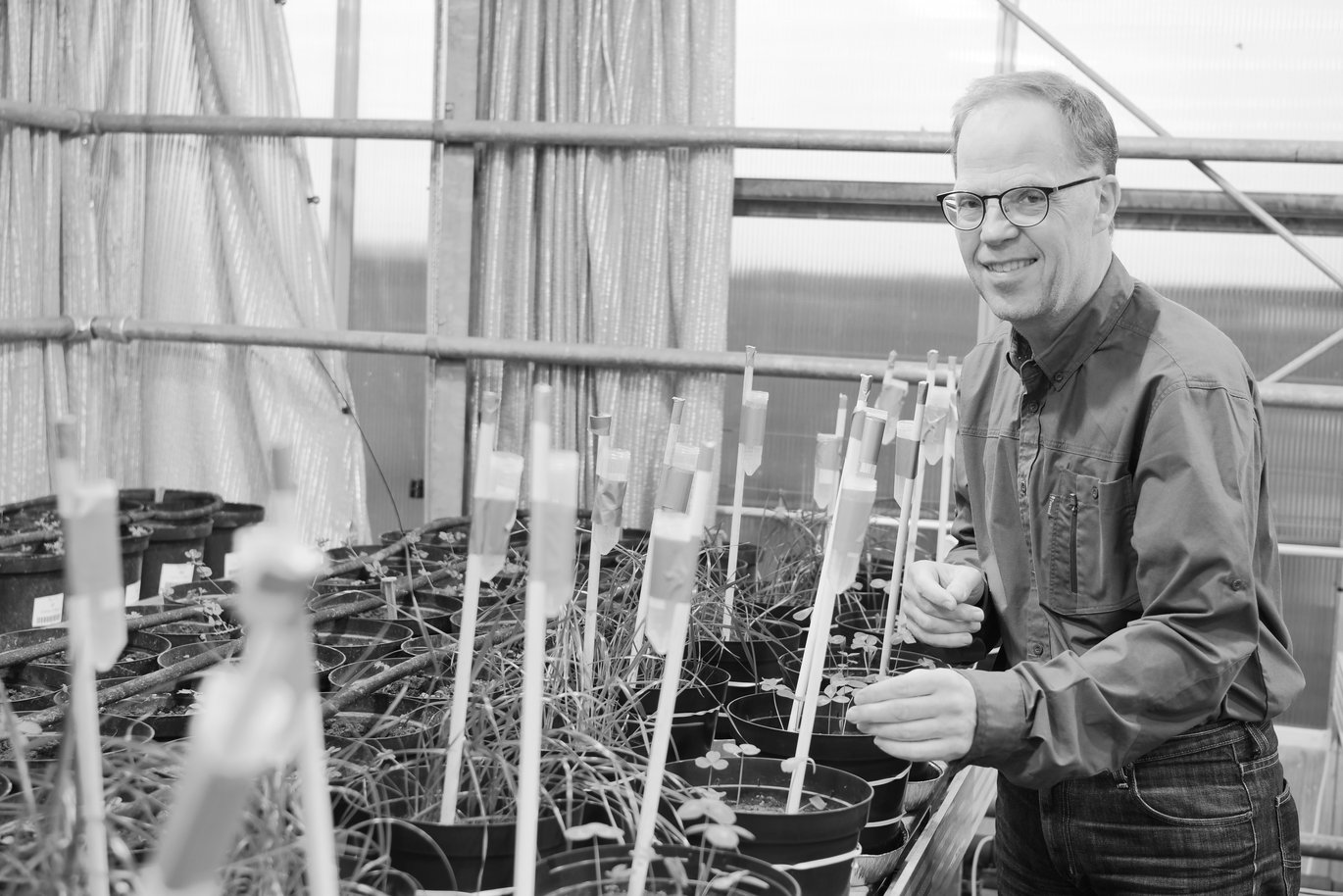Professor Lars Elsgaard's scientific journey in microbiology paves the way for new research in agricultural sustainability
Perhaps it was chance that led Lars Elsgaard onto a scientific journey. A journey that led to research in deep-sea microbiology, an extended stay in France, pioneering research in biochar, and now to a position as professor in microbial ecology at the Department of Agroecology at Aarhus University.

With a background in biology and a fascination for life's mysteries, Lars Elsgaard chose the path of natural sciences. However, it wasn't precisely the path he had foreseen, but a lack of forms for choosing a linguistic line in high school that pushed him towards a mathematical path. That decision led him on a scientific journey into understanding microbial ecology and the significance of microorganisms for agricultural soil.
From the deep sea to agriculture
Lars Elsgaard describes his interest in microbiology as a product of coincidences. While studying at Aarhus University, he had the opportunity to go to France and work with samples from the depths of the ocean, where he, alongside his research group, encountered an unknown world of microorganisms and their interactions with deep-sea wildlife. It was here that he began to grasp how crucial microorganisms are for the life processes that sustain our planet.
"It was a journey that took me to France and to Africa. Here, we studied samples from hot springs at the bottom of the sea and examined the microorganisms living there. Among other things, we conducted fieldwork at Lake Tanganyika, where we lived in tents by the lakeside for a month, studying life at the lake's hot springs," explains the newly appointed professor, who had, among other things, a J.P. Jacobsen Travel Scholarship along the way.
Returning from his Ph.D. studies in France, Lars Elsgaard left behind the organisms of the deep sea. He obtained a position in Foulum, now known as AU Viborg. Here, he worked with microorganisms in the soil, particularly focusing on studying their role in agricultural soil.
"One of my initial projects involved finding microorganisms capable of converting the plant hormone ethylene. We were attempting to prevent greenhouse plants from ripening too quickly. Although the mission didn't entirely succeed as hoped, it led to a patent on a microorganism that could later have applications in air purification," he explains.
Lars Elsgaard's research in agricultural soil has evolved over time. He has worked on topics such as nitrogen dynamics, sewage sludge, and greenhouse gases, contributing to understanding how agriculture impacts the environment. Lately, his focus has been largely on climate and greenhouse gas emissions.
"In several projects, I've been involved in measuring CO2 and nitrous oxide emissions from peatlands that are now drained and cultivated. The results of these studies have influenced Danish emission calculations and demonstrated the significant potential for CO2 release from these soils," he adds.
Teaching and mentoring matter greatly
As a professor in microbial ecology, Lars Elsgaard looks forward to continuing his research on the importance of microorganisms for agricultural nutrient supply and climate impact. Yet, he is also dedicated to educating and mentoring young researchers, supporting their career development so that research can continue far into the future.
"I spend a lot of effort teaching in our bachelor's and master's programs," he says, explaining that working with students and young researchers is an essential part of his job. He takes pride in helping the young researchers in their careers, hoping for a strong team of researchers in soil microbiology in the future.
Biochar - a new research adventure
One of the exciting new chapters in Lars Elsgaard's career, according to himself, is his work with biochar, biomass transformed into a highly stable carbon product through high temperature, applicable to agricultural soil.
"Biochar has become a hot topic in agricultural research as it can significantly impact carbon storage in the soil. It's an area rapidly growing, and we want to investigate and understand how biochar affects the soil environment and the microbial communities within," says the professor.
While he appreciates the increasing focus on biochar, he is also conscious of the importance of long-term experiments to document effects over time. Therefore, he wishes to help establish platforms that can assist researchers and authorities in understanding how biochar affects soil and carbon storage over several decades.
His hope for the future includes building national expertise in biochar—a demand from both authorities and agriculture.
"I'd like to contribute to ensuring that research can document how biochar affects agricultural sustainability, even from a more long-term perspective," he explains.
Lars Elsgaard's journey from coincidences to a professor in microbial ecology has also included a one-year study as a science journalist. It's an inspiring example of how a passion for science and a curious mind can shape our understanding of the world and make an impact in the realm of agricultural research. It's also a journey that occasionally leads him back to his origins. Lars Elsgaard, who still works at AU Viborg, has ongoing experiments located at the Askov Experimental Station in Southern Jutland, where he spent the first years of his life.
"It's quite amusing that every time I go to Askov, I can look over at my childhood home, which is next to the experimental station," he says, mentioning that one of his aspirations as a professor is to participate in initiating long-term experiments with biochar on the test fields close to where he spent his early years.
The Department of Agroecology at Aarhus University has appointed Lars Elsgaard as a professor in microbial ecology effective from October 1, 2023. He will commence his professorship in early 2024; further information will follow.
More Information
Contact: Professor Lars Elsgaard, Department of Agroecology, Aarhus University. Email: lars.elsgaard@agro.au.dk
